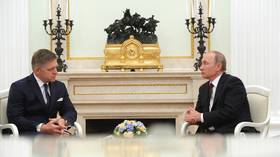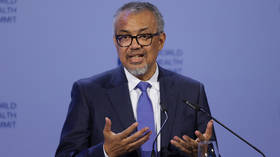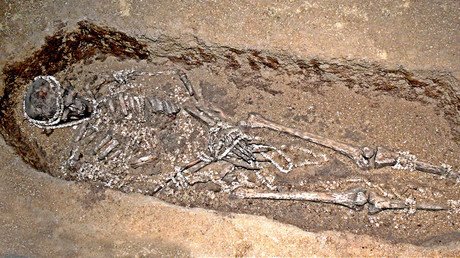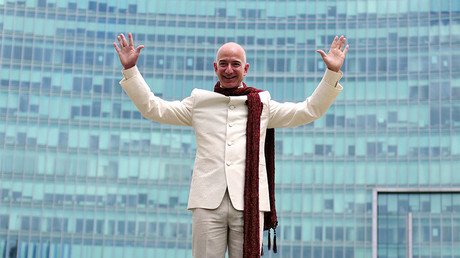Innocent until proven guilty? Not for Placido Domingo: Americans race to condemn, Europeans hesitant
Celebrated opera legend Placido Domingo is the latest to be caught in the crosshairs of the #MeToo movement, but as has become the norm, the accused has been tried in the court of public opinion and declared guilty as charged.
The singer was accused of sexual harassment by multiple women in an explosive AP report this week. It details allegations by eight singers, a dancer and “a half-dozen other women” accusing the Spanish tenor of inappropriate touching, kissing and other unwanted behavior — yet so far, there appears to be no concrete proof underpinning the allegations.
Also on rt.com Philly Orchestra, SF Opera cancel Placido Domingo’s performances after #MeToo reportNonetheless, it took only a matter of hours before the 78-year-old was disinvited from the opening night of the Philadelphia Orchestra in September, where he was slated to perform. The San Francisco Opera followed suit, cancelling an upcoming appearance by Domingo. The Los Angeles Opera was slightly more reticent, saying it would open an investigation into the “concerning allegations.” Domingo was promptly condemned as a “creep” and “molester” on social media, where mob justice reigns.
American condemnation, European hesitation
The immediate, no-questions-asked condemnation appears to be an American trend, however. So far, no European operas have discommunicated Domingo from their ranks — and upcoming performances in Milan, Zurich, London and other capital cities are still scheduled to go ahead as planned.
“We do not see any basis for a statement or reaction based on our current state of knowledge,” the Zurich Opera House said. The head of the upcoming Salzburg Festival, Helga Rabl-Stadler, said she would find it “objectively wrong and irresponsible on a human level to come to definitive judgments at this time.”
Anti-Semitism & MeToo complaints challenge freedom of debateOp-ed by Slavoj ZizekMORE: https://t.co/8YVcsQnUZ3pic.twitter.com/dhpQJDXRAI
— RT (@RT_com) July 12, 2019
Domingo was blasted by industry colleagues in the US. Soprano vocalist Aliana de la Guardia tweeted that she was “not surprised” by the allegations, while classical guitarist Aaron Larget-Caplan didn’t mince words: “He did it. Let him fall.”
Again, the reaction across the pond in Europe was in stark contrast, with Spanish opera singers enthusiastically lining up to defend Domingo. Paloma San Basilio described him as a “gentleman,” a “great companion” and a “generous artist,” while Davinia Rodriguez said she had “never felt the least indication” of the kind of inappropriate behavior described by the accusing women. Instead, she said he had shown her the “maximum of his respect.”
“It's complicated because I don't know what other people have lived and I can't tell if it's true or false, because I wasn't there. But I can say that with me the relationship with him has been of a perfect gentleman and of absolute affection,” added fellow singer Pilar Jurado.
Also on rt.com No reason to doubt Ashley Wagner’s #MeToo story – but accusing a dead man will always anger peopleHow to deal with #MeToo?
Vague accusations of sexual misconduct present a challenge to the media, too. If they appear to take the side of the accuser, they do away with the presumption of innocence, a basic tenet of the US justice system — but if they are too sympathetic to the accused, they are seen to be putting the possible victim on trial. Still, accusers must know they open themselves up to scrutiny in making any serious accusation against another person.
For the media, the optimal solution would be to find some way to strike a fair balance — but the trend for the media in the era of #MeToo, particularly in the US, has been to immediately take the side of the accusers without any interrogation of the facts.
Would #MeToo reach out 'really' further?https://t.co/ijkiNiFttQ
— RT (@RT_com) July 5, 2019
Yet, in cases such as Domingo’s, the unfortunate reality is that it will nearly always be a case of ‘he said, she said.’ Very rarely can there be concrete evidence that a person inappropriately groped or touched another decades prior.
This is a time during which anyone, anywhere, at any time, can lob an accusation into the public domain and the media will instantly circle the wagons to defend the accuser’s version of events, leaving little room for doubt or scrutiny of the claims.
The American media’s appetite for more and more #MeToo stories appears to be showing no signs of abating and is well-matched by the public’s enthusiasm for throwing any accused person to the wolves at the first whispers of possible misconduct, investigations be damned.
Like this story? Share it with a friend!














